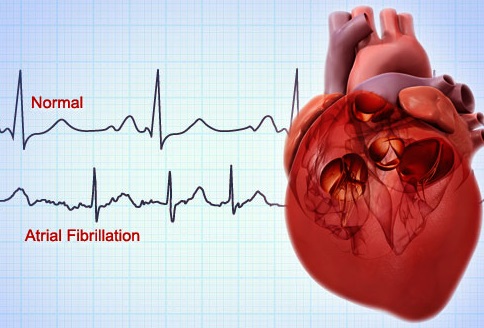Nikhil Prasad Fact checked by:Thailand Medical News Team Feb 16, 2025 1 month, 3 weeks, 5 days, 23 hours, 32 minutes ago
Medical News: Understanding the Link Between Atrial Fibrillation and Heart Disease
A new study conducted by researchers from the University Hospital of Ioannina, Greece, has shed light on the significant link between atrial fibrillation (AF) and myocardial ischemia, a condition where the heart does not receive enough blood due to blocked arteries. AF is a common irregular heartbeat disorder that affects millions worldwide, often leading to severe cardiovascular complications. The study suggests that AF may be an independent predictor of myocardial ischemia, even in patients who have no prior history of coronary artery disease (CAD).
 Atrial Fibrillation Found to Be a Key Indicator of Myocardial Ischemia
Atrial Fibrillation Found to Be a Key Indicator of Myocardial Ischemia
This
Medical News report highlights the importance of the study, which examined the presence of myocardial ischemia in patients with and without AF. The findings have significant implications for how doctors assess and manage heart disease risk in individuals suffering from AF.
The Study and Its Objectives
The research aimed to investigate whether AF contributes directly to heart complications by examining myocardial perfusion, the process by which blood is supplied to the heart muscle. The study involved 259 patients who were undergoing myocardial perfusion imaging (MPI) to check for signs of heart disease. Out of these patients, 90 had a history of AF, while the remaining 169 did not.
Using advanced imaging techniques, the researchers assessed the severity of myocardial ischemia in these patients. The primary focus was to determine whether AF could independently predict ischemia, beyond traditional risk factors such as high blood pressure, diabetes, and high cholesterol levels.
Key Findings of the Study
One of the most striking findings was that patients with AF were significantly more likely to exhibit myocardial ischemia. The study found that:
-Patients with AF had a fivefold increased risk of developing myocardial ischemia compared to those without AF.
-Men and older adults were at a particularly higher risk, with ischemic abnormalities more prevalent among male patients.
-Even after adjusting for other cardiovascular risk factors, AF remained a strong predictor of myocardial ischemia.
-Patients with AF also showed more severe and widespread ischemic abnormalities in MPI imaging.
These results suggest that AF is not just a byproduct of underlying heart disease but may actively contribute to worsening heart conditions. The researchers emphasized that AF could play a crucial role in triggering or exacerbating myocardial ischemia by increasing the heart’s oxygen demand while simultaneously impairing its ability to receive sufficient blood flow.
What This Means for Patients and Healthcare Providers
The findings of this study could significantly influence how doctors approach heart disease prevention and treat
ment in patients with AF. Given that AF is often dismissed as a rhythm disorder rather than a direct cause of heart complications, these new insights suggest that more proactive heart monitoring may be necessary.
For patients with AF, this means:
-They should be closely monitored for signs of myocardial ischemia, even if they have no prior history of coronary artery disease.
-More aggressive management of heart disease risk factors, such as controlling blood pressure, cholesterol, and diabetes, could help reduce the likelihood of developing ischemia.
-Regular cardiac imaging may be beneficial in detecting early signs of heart complications before they become severe.
For doctors and medical professionals, the study suggests:
-A need for revised clinical guidelines that consider AF as a standalone risk factor for heart disease.
-A shift toward earlier intervention strategies, including the use of medication and lifestyle changes to manage AF’s impact on heart health.
Further studies to explore whether treating AF more aggressively could help lower the risk of myocardial ischemia and its related complications.
The Broader Implications of the Study
AF is one of the most common heart rhythm disorders, affecting millions of people worldwide. This study provides critical evidence that AF does not just co-exist with heart disease but may actively contribute to its progression. The researchers suggest that AF could promote a “pro-atherogenic environment,” leading to increased inflammation, oxidative stress, and ultimately, higher rates of artery blockage.
Additionally, the study highlights the need for improved diagnostic strategies. Traditional methods for assessing heart disease risk may overlook the impact of AF, leading to missed opportunities for early intervention. The use of MPI and other imaging technologies could help bridge this gap by providing a clearer picture of how AF affects heart function over time.
Conclusion
The link between atrial fibrillation and myocardial ischemia is stronger than previously thought. This study emphasizes the need for a paradigm shift in how AF patients are assessed and treated. Rather than viewing AF merely as a rhythm disorder, medical professionals should recognize its potential to independently contribute to heart disease. Future research should explore whether treating AF more aggressively can reduce the risk of ischemia and improve overall heart health outcomes.
The study findings were published in the peer-reviewed journal: Medicina.
https://www.mdpi.com/1648-9144/61/2/337
For the latest on Myocardial Ischemia, keep on logging to Thailand
Medical News.
Read Also:
https://www.thailandmedical.news/news/doctors-warn-that-covid-19-infections-can-induce-a-dangerous-condition-known-as-complete-heart-block
https://www.thailandmedical.news/news/covid-19-causes-qtc-prolongations-and-disruptions-in-cardiac-electrophysiology
https://www.thailandmedical.news/news/abelacimab-shows-significant-reduction-in-bleeding-events-for-atrial-fibrillation-patients
https://www.thailandmedical.news/pages/thailand_doctors_listings
